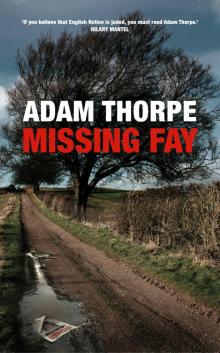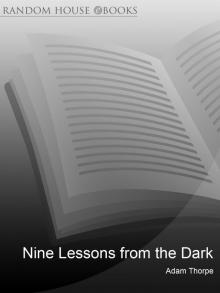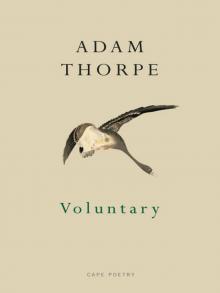- Home
- Adam Thorpe
No Telling
No Telling Read online
NO TELLING
ADAM THORPE
Contents
Cover
Title
Copyright
Dedication
By the Same Author
Chapter 1
Chapter 2
Chapter 3
Chapter 4
Chapter 5
Chapter 6
Chapter 7
Chapter 8
Chapter 9
Chapter 10
Chapter 11
Chapter 12
Chapter 13
Chapter 14
Chapter 15
Chapter 16
Chapter 17
Chapter 18
Chapter 19
Chapter 20
Chapter 21
Chapter 22
Chapter 23
Chapter 24
Chapter 25
Chapter 26
Acknowledgements
This eBook is copyright material and must not be copied, reproduced, transferred, distributed, leased, licensed or publicly performed or used in any way except as specifically permitted in writing by the publishers, as allowed under the terms and conditions under which it was purchased or as strictly permitted by applicable copyright law. Any unauthorised distribution or use of this text may be a direct infringement of the author’s and publisher’s rights and those responsible may be liable in law accordingly.
Version 1.0
Epub ISBN 9781446420454
www.randomhouse.co.uk
Published by Jonathan Cape 2003
2 4 6 8 10 9 7 5 3 1
Copyright © Adam Thorpe 2003
Adam Thorpe has asserted his right under the Copyright, Designs and Patents Act 1988 to be identified as the author of this work
This book is sold subject to the condition that it shall not, by way of trade or otherwise, be lent, resold, hired out, or otherwise circulated without the publisher’s prior consent in any form of binding or cover other than that in which it is published and without a similar condition including this condition being imposed on the subsequent purchaser
First published in Great Britain in 2003 by
Jonathan Cape
Random House, 20 Vauxhall Bridge Road,
London SW1V 2SA
Random House Australia (Pty) Limited
20 Alfred Street, Milsons Point, Sydney,
New South Wales 2061, Australia
Random House New Zealand Limited
18 Poland Road, Glenfield,
Auckland 10, New Zealand
Random House South Africa (Pty) Limited
Endulini, 5A Jubilee Road, Parktown 2193, South Africa
The Random House Group Limited Reg. No. 954009
www.randomhouse.co.uk
A CIP catalogue record for this book is available from the British Library
ISBN 0-224-06234-4
FOR MY CHILDREN
BY THE SAME AUTHOR
FICTION
Ulverton
Still
Pieces of Light
Shifts
Nineteen Twenty-One
POETRY
Mornings in the Baltic
Meeting Montaigne
From the Neanderthal
Sous les pavés, la plage
Underneath the paving stones, the beach
May 68 graffiti
1
I was born into industrial vacuum cleaners.
Our house, in the suburbs, had an extension like a shop, but it wasn’t a shop. It was a huge block with a plate-glass window facing the road and it made the house look small. Inside it were the industrial vacuum cleaners, standing about on the floor or sleeping in a wall made of cardboard boxes at the back. This room was called two names: sometimes ‘showroom’, sometimes ‘stockroom’.
I was three or four when I first realised that this huge room was different from the rest of the house. It had its own shiny smell, which was stronger near the boxes and had no people in it – even after a client had been. On one wall was a large board with lines and lines of holes and some white hooks stuck in the holes. Nothing hung from the hooks and the lines of holes danced about when you looked at them. The whole room was very calm, as if the air was holding its breath.
When a client came, it exploded into noise. The roaring vacuum cleaners grew quieter and quieter in my ears and yet everyone was still shouting.
One day my sister was teaching me vingt-et-un in the kitchen. I was five, she was thirteen. My mother was out shopping, my father was at home, working. There was a ring at the front door and my sister left me with the cards and told me not to cheat. It was a client, I could see him at the other end of the hallway, standing on the front step. She went to find Papa in the stockroom. The client stood in the sunlight looking at his watch and at the road and at me, giving me a smile because I was staring at him from the kitchen. He fingered his collar and tapped his hand on the briefcase under his arm, lifted his chin and stroked it underneath, and looked at his watch. He had a wide striped tie and a dark hat and a white handkerchief sticking out of his top pocket. I wanted to peep at my sister’s cards. He gave me a little wave, then stroked the underneath of his chin again and after that he looked at his watch.
I was at my grandfather’s and aunt’s for a few days, with the loud aeroplanes and the cold sheets, and then I came back. My father wasn’t at home any more. My mother told me he’d gone ‘on a long voyage’. I waited each morning for a letter to come with a funny stamp.
He was also in the sitting-room, behind the glass animals. He looked a bit cross, and his ears stuck out. There were trees and a telegraph pole behind him.
My mother and I were in the kitchen one day. I was trying to make an aircraft carrier out of a piece of wood, marking lines with my penknife where the jet fighters were stopped from falling off the deck by the elastic cords.
‘When’s Papa coming back from his voyage, Maman?’
‘It’s a very long voyage, Gilles. In fact, poor Papa has gone all the way to God, dear.’
‘That’s good.’
‘Not for us.’
‘You mean he’s dead?’
She nodded, and carried on cleaning the sink.
‘On a ship?’
She didn’t reply at first. I thought it would be good to put a big cabin on the aircraft carrier, with a tall radar mast.
‘You can light a candle for him,’ she whispered.
She was upset. I had upset her.
I didn’t say anything more. I kept the aircraft carrier just as it was, not even finished. This was about six months after Papa had left us, still in 1960. I helped my mother light a candle for him in church every Sunday from then on because the candle’s flame was the lifting of your spirit and your heart towards God. If you said a prayer at the same time then the melting wax became the homage to your devotion and GOD GRANTED IT. I prayed to the Virgin Mary that he might come back and if not come back then go straight to Heaven, if he wasn’t there already. My mother took me to the cemetery like a park and showed me where my grandmother lay in peace and my father lay in peace under the same stone. I saw a squirrel and two birds.
We went with Oncle Alain. He raced me on the paths and I always won, making him laugh. Oncle Alain was my father’s younger brother. He was looking after the industrial vacuum cleaners for us. We sat in church one day with a lot of other people and he got up and married Maman.
I was told to call him ‘Papa’, too. He had a big voice and big hands that liked to mess up my hair as if rubbing me out and he was always smoking cigarettes. My mother started to call my real father by his first name, Henri – even to me. I went on lighting a candle to my real Papa, though I said it was for general devotion.
Oncle Alain never called the showroom ‘the stockroom’.
He painted it blue with a yellow stripe in the middle, like in an ice cream. He let me watch him on the high plank. He let the paint dry and then he put up pictures of snowy mountains and peaks and some shiny posters sent by the people who made the vacuum cleaners: Tornado and Aspiron and Philips. The dancing holes were covered by little plastic boxes holding spare parts, hanging from the hooks. He unscrewed the broken white blinds stuck at the top of the window and threw them away. He put plastic plants between the vacuum cleaners and a real woman in a photograph made of cardboard, bigger than me. She was standing up in an apron and smiling and pointing; her eyes followed you until you went behind her.
He put a ladder against the outside wall and painted on another woman. She was holding the tube of a red vacuum cleaner. Her eyelashes were too big and her nose was two dots and her mouth was full of white. You could see her from a long way down the road. She had a blue apron on. Her name was Marilyn. My mother thought she would put people off.
‘There’s a lot of corn in Egypt, little man,’ my uncle said, one day, rubbing his hands and looking around him. We were standing by a fence near the centre of Bagneux. On the other side of the fence there was a lot of noise, and dust going up like smoke. There was a sign on stilts.
I didn’t know what he meant.
‘Brand-new offices,’ he said, pointing at the sign on stilts.
He explained that a lot of offices were being built in Bagneux and they needed cleaning. Factories, offices, hospitals: thousands of square metres of floor and carpet. His hand rubbed my hair so that I had to smooth it again. We would be rich, like Maman’s cousin in the middle of Paris who had married someone important. Factories, offices, hospitals.
Chimneys, too: he had special vacuum cleaners for cleaning chimneys. One day he sent out thousands of slips of paper: they showed a black monster with two white eyes, holding a long brush. Next to the monster stood a shining white man in overalls holding a Tornado. Our name and address were at the top, which made me feel shy – the same feeling I got when I looked at our name on the front of the showroom. There were some vegetable plots at the end of our road. One day they turned into a block of flats being built, with tall cranes. We drove past them and I said, ‘That’s Egypt.’ My uncle laughed as if I’d told a joke.
My mother didn’t like the dust, though. ‘You’d think we were back in the war,’ she kept saying. ‘You’d think Bagneux was being bombed again.’ My uncle kept showing the dust on his finger and saying, ‘When builders are happy, everyone’s happy.’ The building sites kept thumping in the distance, and this thumping made me feel warm inside.
As I grew older, I spent more and more time in the showroom (or stockroom). I would stand by the big plate-glass window and look out on the road with its swishing cars. I was the pilot of a space-craft, exploring an unknown galaxy. My crew of strange but very intelligent aliens stood behind me. They had one tentacle each and the mouth was on the end of it.
When my grandfather had built the house, the road was far less busy. At least, this is what he’d say whenever he came over with my aunt. They lived in a bungalow near Le Bourget. We saw each other once or twice a month, crossing Paris or going round the edge to get to each other’s house. I hated Tante Clothilde’s cooking when we went there.
My mother would always say, even if we were at my grandfather’s (usually after a plane had gone overhead), ‘Well, I can tell you, the road’s busier and busier in front.’
Then my grandfather – Gigi – would remember the days when there would be no cars at all, only a horse and wagon sometimes, on its way to town, carrying vegetables or fruit.
‘Rubbish,’ Tante Clothilde would snort. ‘It’s always been busy. Even with the Romans it was busy.’
‘You were there, I suppose?’ Gigi would always joke.
‘It’s only one of the main roads into Paris from the south, Papa,’ she’d sigh, as if he was a little boy.
My grandfather would then reply in a loud voice that his very own father remembered it when it was a little muddy path between hedges because his very own father would take it every day, as a boy, to work in the plaster quarry near the Montrouge fort.
‘You’re making things up, you’re always making up stories, Papie was never a quarry worker—’
Gigi had a special plate in his leg from the First World War. He would tap his thigh when Tante Clothilde said he was making things up and shout, ‘So I make things up about Verdun, do I?’
It always went the same way, once my mother had started it. One time, just to test, I tried saying how busy our road was. It didn’t go quite the same way because my mother said, ‘Yes, and just you remember to be careful not to run across it.’ But you could still recognise the other one underneath, and it finished with Gigi tapping his thigh.
In fact, the metallic sound the tapping made was his cigarette tin, but everyone said that it was true about his special plate and that he still had a piece of shrapnel in him – and that’s why he limped badly. His name was Georges but everyone called him ‘Gigi’ because he drove about in a rusty Dauphine with GIG on the back windscreen standing for Grand Invalide de Guerre. There was another war a long time ago which my mother and father and Oncle Alain were in, but Gigi didn’t get his limp in that one.
It was unfair that Gigi had built the house himself, and later the showroom, and then had to go off and live with Tante Clothilde in her bungalow with planes roaring overhead, making the wire mesh on their electric fire sing.
I could never work out, if there were far fewer buildings on the road in Gigi’s day, why our house had always been number 293. Perhaps it hadn’t, although no one seemed to know. I asked my mother if we couldn’t have a name, like Mon Repos, instead of a number, but she said that changing it would be sacrilegious to the Gobains. She said this as if she found them a bit funny. I realised that 293 was, in fact, a kind of name. The showroom had its own number, next to the metal swing door on the side: 293 bis.
It felt powerful, looking out on the wide road through the plate glass of the showroom. There were no blinds to hide it, now, even at night. The cars sped by almost silently and the pedestrians never noticed I was there. On the other side of the road stood some brown flats, set back a bit. Gigi remembered helping to build them just after the war, when everyone was poor; they had three spiral stairs on the front of them like springs stretched down. Next to the flats there was a peeling side of a brick building with La Plus Brillante de Brillant painted high up in faded letters. Then, if I pressed myself to the glass, I could see a big metal door no one was allowed to park in front of Jour et Nuit, though I never saw anyone using it.
In front of the flats, by the bus-stop, was a tree. In the spring it suddenly grew enormous with leaves and hid everything behind it. Behind me, as I stood there looking out, were my invaders from outer space with a mouth on the end of a tentacle. Their eyes were disguised as white pushbuttons and they had tiny chrome hands each side of their tubby bodies, like the boy born without arms in Bagneux because of something his mother took. Their bodies were blue or green or red. By now they were the same height as me, and I imagined myself as their leader, come to take over the world. We cruised towards Planet Earth and then landed at night and hummed all over the country, sucking everything up, everybody who stood against us. I gave them different names, depending on their looks; Chou, Cacao, Bouboule, le Grand Caïd.
I always gave them orders aloud, in a loud whisper. I’d never move, though. Everything went on in my head. We had amazing adventures, but nobody else knew – even if they looked in through the glass. People did, passing by. All they saw was a boy standing very still and some industrial vacuum cleaners behind him, on show.
I was allowed into the showroom whenever I liked, except after the floor had been mopped. Once I went in when the floor was still wet and my mother whacked me. She hardly ever whacked me, normally. It was much better when I was on my own. When my uncle was in there with a client, pointing at this machine or that machine, talking about
cylinders and floorheads and turbines, about suction action and dust chamber and commercial usage, I felt as if I had swallowed something grey and heavy. It always seemed to be raining when either my uncle or my mother was in there. The rain flicked at the glass and distorted the view, and it seemed even darker outside because of the bright neon lights inside. I would never switch on the neon lights, not when I was on my own. There was one bulb that was always on above the door, day and night, because it was only 30 watts. That was enough; it was too expensive to have the showroom blazing all day, my uncle said. He kept the heating quite low, even in winter. I got used to the chilliness.
‘Anyway, we’re not a shop, chum,’ he’d say. ‘We’re definitely not a shop.’
I was nine when I slipped. I went in too soon after the showroom floor had been mopped and hit my head on the metal handle of a new Aspiron Special 115. Blood dripped onto the gleaming wet lino, making a shape like a hairy caterpillar. I wiped the lino clean with the inside of my shorts’ pocket and went to find my mother.
She was hanging out the washing in our back yard. She went very pale and took me to the doctor’s, where I had five stitches. He said that one’s forehead skin was so tight it could literally burst, like a tomato. There was blood all down my shirt.
I’d told my mother that I had slipped on the crazy paving by the front door; I didn’t want to admit that I had gone into the showroom when the floor was still wet. She said it was dangerous, that the crazy paving would really have to go. A few weeks later, over a single weekend, my uncle hired a machine to tear up the whole lot and then covered it in concrete. He put a few plants in white plastic pots on top to make it look pretty.
My grandfather came for Sunday lunch that day and watched his son lay the concrete. Gigi looked a bit fed-up, because it had taken him a long time back in 1948 to lay the blue and pink slabs.
‘And they hadn’t come free,’ he said.
The crazy paving continued up the wall to the bottom windows; Gigi was proud of this decoration, it made the house look smarter, he said, even though there were bits of it broken off. He hoped my uncle would leave this strip of crazy paving on the wall.

 Missing Fay
Missing Fay Hodd
Hodd Pieces of Light
Pieces of Light The Standing Pool
The Standing Pool Ulverton
Ulverton Nine Lessons From the Dark
Nine Lessons From the Dark Flight
Flight The Rules of Perspective
The Rules of Perspective From the Neanderthal
From the Neanderthal Is This the Way You Said?
Is This the Way You Said? Still
Still No Telling
No Telling Voluntary
Voluntary Between Each Breath
Between Each Breath